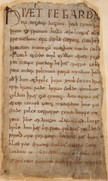His Mighty Arm: What We Learn About Christ from Beowulf
Posted On January 26, 2017
The pages of the world’s greatest works are rife with Christ-figures. They take various names, roles, and appearances. But in them all there are certain unifying traits. These figures are classic heroes, not simply leaders of men or people of renown. They possess a certain clout that hangs about them, a wreath of dignity and distinction. In the familiar figure of Beowulf, we find all of these traits encapsulated, making him perhaps the stereotypical Christ-figure of Western literature.
The person of Beowulf alone is nearly enough to warrant the title. Capable of swimming for days and doing battle with the mightiest of fiends, the Geat thane makes an impressive show as he dons his “glittering mail-shirt” and brandishes his scything sword. But the personality of Beowulf matches his massive physique. He doesn’t just conquer the wicked beast Grendel; he pins the demon’s severed arm to a wall. If Beowulf is not a classic hero (and we may take that term to be synonymous with “Christ-figure”), then he is a leader of men par excellence.
Perhaps it is ultimately circumstance that transforms this leader into a legend. The objective facts––that he is who he is and that the world is as it is––come together to fashion the hero. Faced with the news of Grendel’s crimes, he finds it “hard to ignore” and goes scouring the ranks of his armies, “enlisting men, the best he could find.” He casts aside his blade when it fails to penetrate his foe’s hide and attacks bare-fisted. It is his nature to do so under the circumstances. Beowulf must become a hero; he has no choice in the matter.
But what, in the end, makes Beowulf a classic hero? The single fact which raises Beowulf to the highest echelon of heroism and places him atop the highest literary pedestal is that from there, he falls. His final fight ends in defeat. He receives no lasting gifts, though he confidently sallies forth to plunder the dragon’s shadowy cave, nor does he give any enduring good thing to the people of his kingdom. Beowulf is a Christ-figure but not the Christ; he is not able to redeem and rescue those entrusted to him from the clutches of evil or the scourge of wickedness. The kingdom of Beowulf is neither secure nor everlasting. No, another dragon-slayer must arise, and he must bear gracious gifts, and in his death there must be no defeat. This is the glory of the Christ. He slaughters the serpent, binding the strong man and silencing the forked tongue of the accuser. He thunders into the darkened domain of sin, wielding truth for a sword and shining the light of His glory into its most distant corner––a light of glory which we have seen and which proves to us that He indeed is full of grace and of truth. Of His kingdom there shall be no end, and to his atoning, redeeming blood there shall be no objection. As the prophet Isaiah writes, “Comfort, comfort my people, says your God. Speak tenderly to Jerusalem, and cry to her that her warfare is ended, that her iniquity is pardoned… Behold, the Lord God comes with might, and his arm rules for him.”
— Tyler Freire is a Senior at Reformation Bible College.
